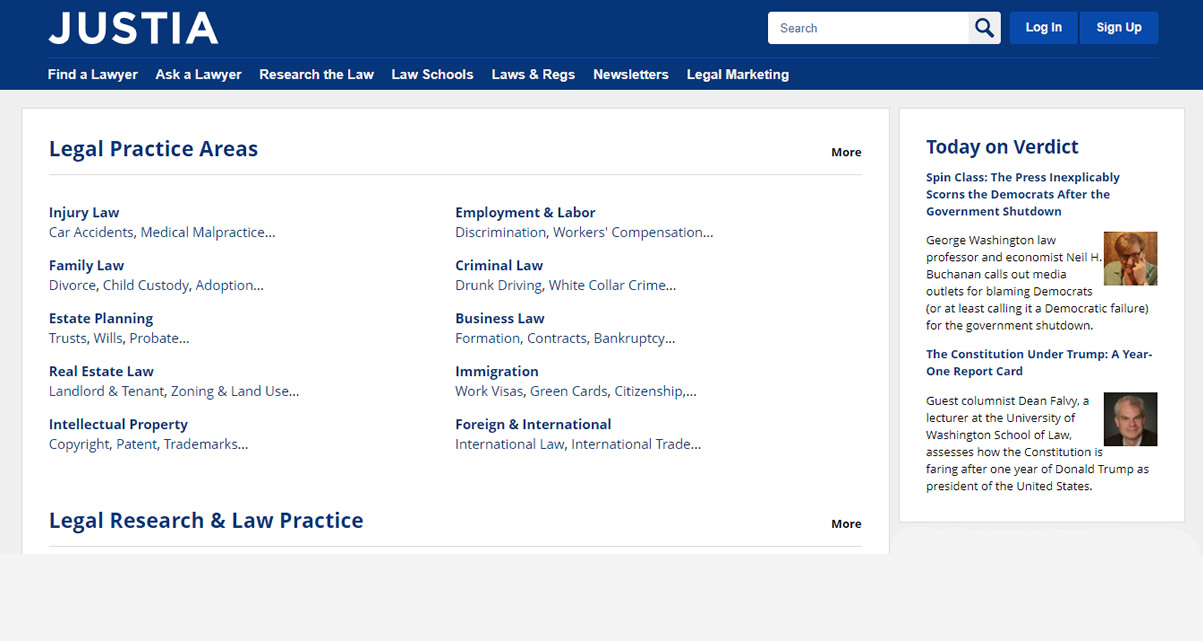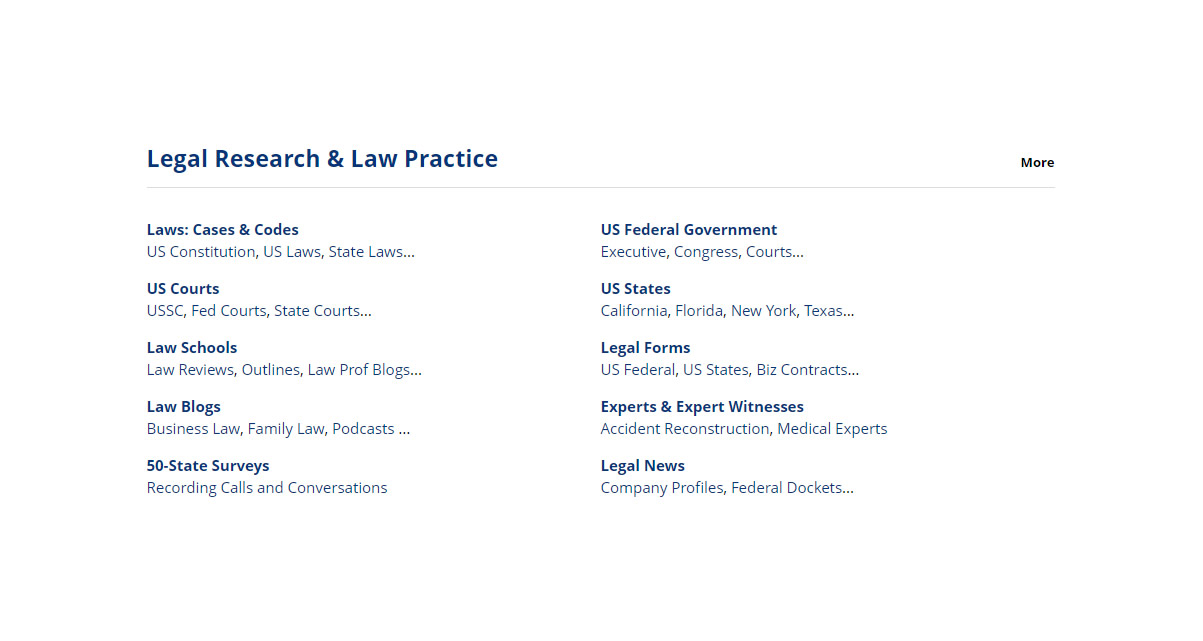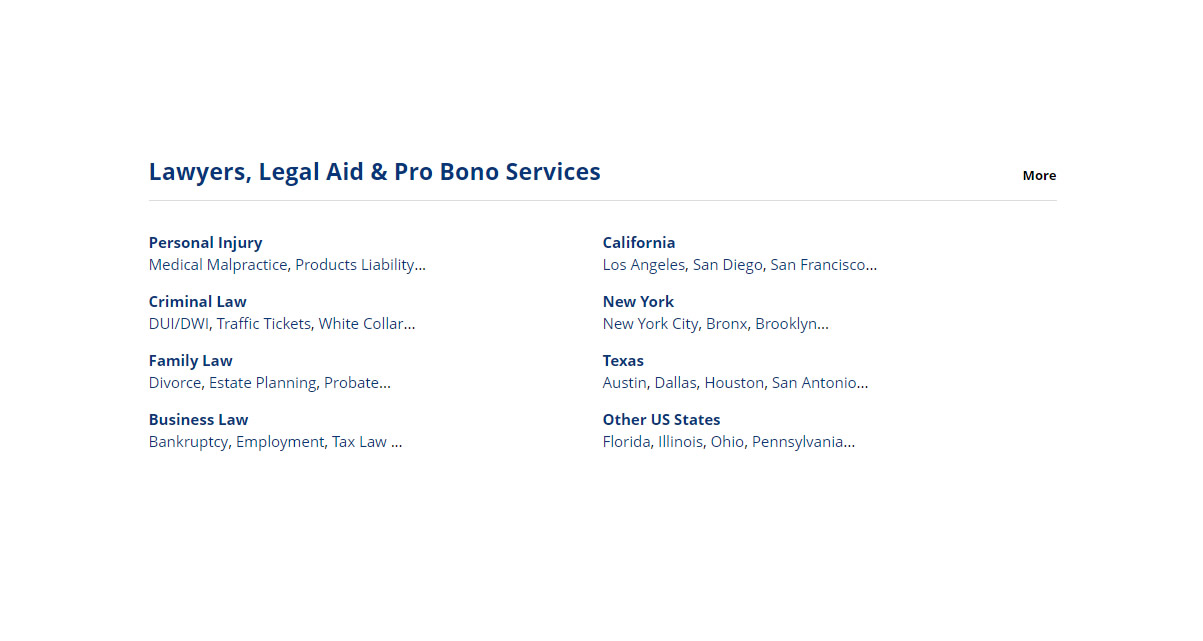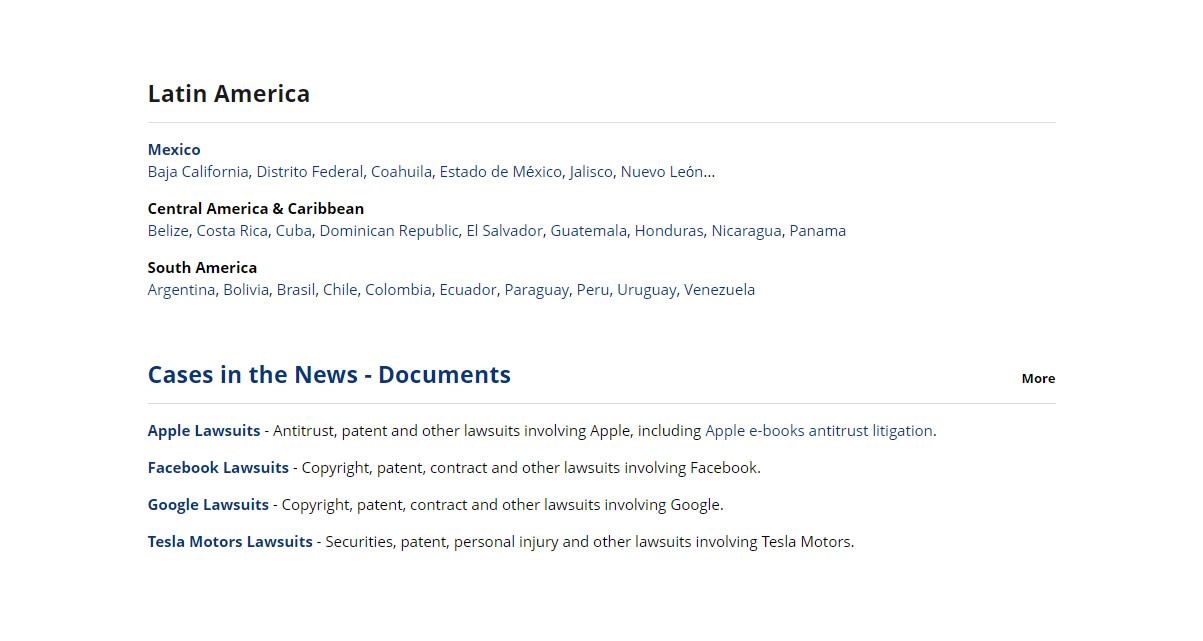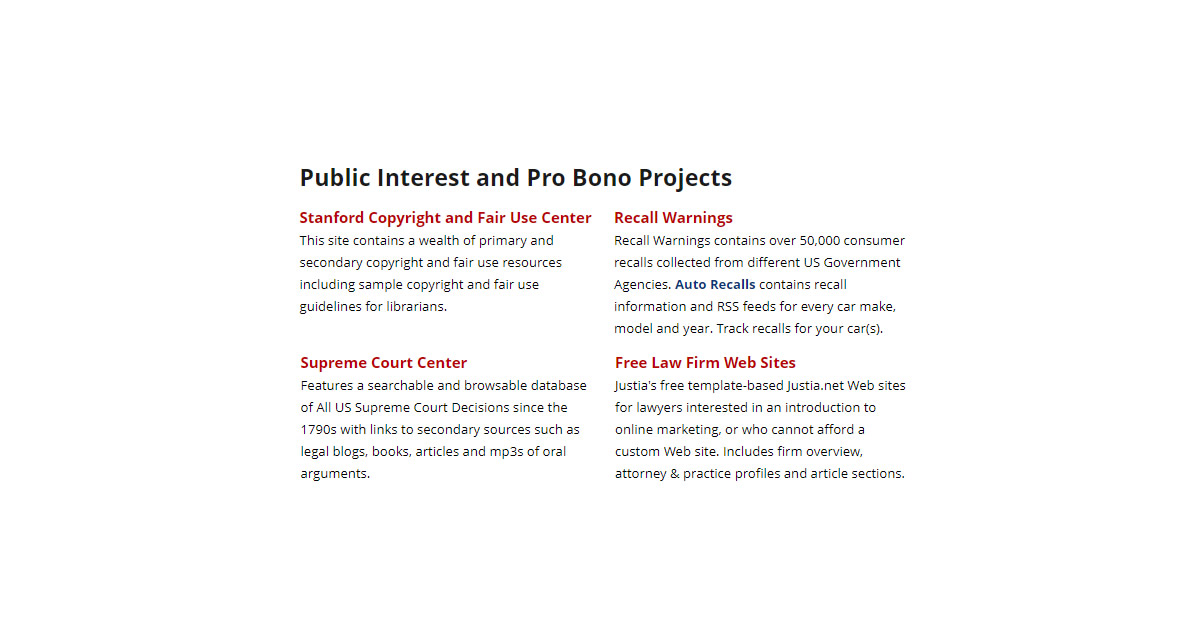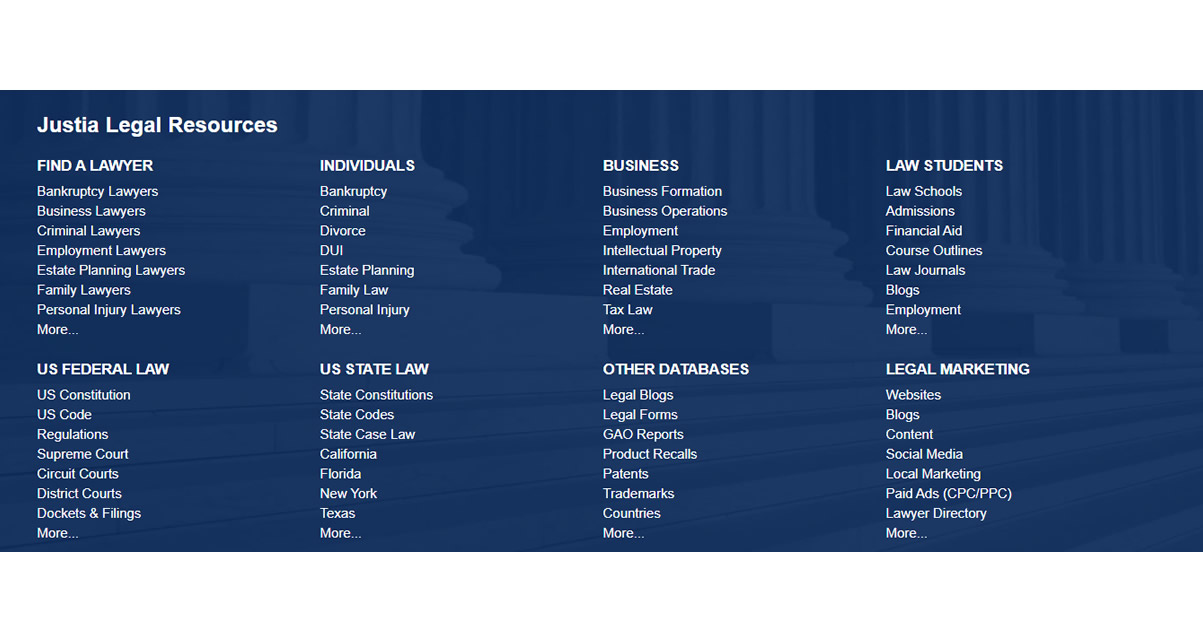Based in the heart of Silicon Valley, Justia's mission is to advance the availability of legal resources for the benefit of society. We are especially focused on making primary legal materials and community resources free and easy to find on the Internet. The company provides Internet users with free case law, codes, regulations, legal articles and legal blog and twitterer databases, as well as additional community resources. Justia works with educational, public interest and other socially focused organizations to bring legal and consumer information to the online community.
Justia provides premium Web site, blogging and online marketing solutions to help law firms optimize their marketing budget and provide their clients with an increased level of information and service. Learn more about Justia's Online Marketing Solutions.
Justia is headquartered in Mountain View, California.
Legal Practice Areas
Personal Injury
Personal injury law is an area of civil law concerned with providing monetary compensation to victims of accidents or social wrongs. The injured person bringing the lawsuit is called the "plaintiff," and the person or entity allegedly responsible for the injury is called the "defendant." In fatal accidents, the family of the decedent may bring a wrongful death suit against the person or entity responsible for the accident.
In some cases, there may be multiple responsible parties, and the plaintiff may be able to sue all of them to recover the full amount of compensation needed for his or her injuries. The defendant in turn may allege that another person or entity was responsible and bring that person or entity into the lawsuit as a cross-defendant.
The burden of proof in personal injury cases is typically lower than the burden of proof for criminal cases arising out of the same actions. This means that you may be able to recover in a personal injury lawsuit, even if the defendant was acquitted of criminal charges arising out of the same conduct. The objective in a personal injury lawsuit is generally to recover monetary compensation, rather than punish the defendant. However, in some cases, punitive damages may be sought and awarded for particularly egregious or malicious misconduct by a defendant.
Elements of Negligence
Personal injury lawsuits may arise out of any situation, including motor vehicle accidents, premises liability, professional malpractice, or nursing home abuse. Most injuries are the result of negligent or reckless conduct, rather than intentional conduct. In most states, a plaintiff claiming negligence will need to prove (1) the defendant's duty of care, (2) the defendant's breach of that duty, (3) actual causation, (4) proximate causation, and (5) actual damages.
A defendant's duty varies depending on the state and the circumstances. Generally, however, everyone has a duty to use reasonable care to avoid the risk of foreseeable injuries to others. For example, a driver who has had four cocktails shouldn't get behind the wheel of a car because of the significant risk he or she will get into a car accident. It also means that if a retailer notices that a handrail on the second floor of a store has come loose, such that a customer could lean on it and fall, the retailer has a duty to warn customers or to repair the loose handrail so that unwitting customers don't get injured. Failure to warn of a dangerous condition on property can result in a premises liability lawsuit against the person or entity in control of it.
Similarly, a doctor has a duty to act as a reasonably prudent doctor with similar training and expertise would act. He or she must order the appropriate tests or refer a patient to a specialist when faced with a potential diagnosis of a certain disease. A doctor who fails to meet the professional standard of care may be subject to a medical malpractice suit.
A plaintiff's failure to prove any of the elements of negligence can result in a case getting dismissed or in the defendant avoiding liability. If there are too many intervening events between the defendant's breach and a plaintiff's injury, the defendant's breach may not be considered the "proximate" or legal cause of the injury.
For example, consider a driver doing her makeup in the car. A motorcyclist decides to change lanes to avoid this distracted driver. Meanwhile, a deer crosses the road, and the motorcyclist swerves to avoid hitting the deer and crashes into a car that is illegally parked on the side of the road. In that case, the deer and the illegally parked cars are intervening causes of the motorcyclist's accident. The driver may have been negligent in putting on makeup in the car, but her conduct was not the "proximate" cause of the victim's injuries.
Forms of Compensation
In most personal injury cases, a plaintiff may recover economic and noneconomic compensatory damages, which may include past and future medical expenses, past and future lost wages, vocational rehabilitation, household help, out-of-pocket costs, loss of consortium, and pain and suffering.
Economic damages are those that are tied to tangible losses, often shown by submitting documentation. Usually, a plaintiff can try to recover all of his or her economic damages, such as medical expenses or lost income. In some states, however, pain and suffering or other noneconomic damages are "capped" in all personal injury cases, or sometimes just in medical malpractice cases. "Capped" means that a plaintiff cannot recover more than a set amount of damages.
Lawyers, Legal Aid & Pro Bono Services
US State Law
Latin America
Mexico
Baja California, Distrito Federal, Coahuila, Estado de México, Jalisco, Nuevo León…
Central America & Caribbean
Belize, Costa Rica, Cuba, Dominican Republic, El Salvador, Guatemala, Honduras, Nicaragua, Panama
South America
Argentina, Bolivia, Brasil, Chile, Colombia, Ecuador, Paraguay, Peru, Uruguay, Venezuela
Cases in the News – Documents
Apple Lawsuits – Antitrust, patent and other lawsuits involving Apple, including Apple e-books antitrust litigation.
Facebook Lawsuits – Copyright, patent, contract and other lawsuits involving Facebook.
Google Lawsuits – Copyright, patent, contract and other lawsuits involving Google.
Tesla Motors Lawsuits – Securities, patent, personal injury and other lawsuits involving Tesla Motors.
Public Interest and Pro Bono Projects
Stanford Copyright and Fair Use Center
This site contains a wealth of primary and secondary copyright and fair use resources including sample copyright and fair use guidelines for librarians.
Recall Warnings contains over 50,000 consumer recalls collected from different US Government Agencies. Auto Recalls contains recall information and RSS feeds for every car make, model and year. Track recalls for your car(s).
Features a searchable and browsable database of All US Supreme Court Decisions since the 1790s with links to secondary sources such as legal blogs, books, articles and mp3s of oral arguments.
Justia's free template-based Justia.net Web sites for lawyers interested in an introduction to online marketing, or who cannot afford a custom Web site. Includes firm overview, attorney & practice profiles and article sections.





